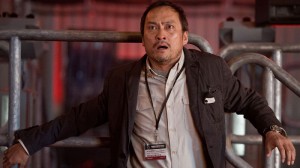LOS ANGELES, California — The world’s most revered monster is reborn as Warner Bros. Pictures and Legendary Pictures unleash the epic action adventure “Godzilla” nationwide in the US May 16.
Visionary new director Gareth Edwards (“Monsters”) delivers a powerful story of human courage and reconciliation in the face of titanic forces of nature, when the awe-inspiring Godzilla rises to restore balance as humanity stands defenseless.
The film stars an international ensemble cast led by Aaron Taylor-Johnson (“Kick-Ass”), Oscar nominee Ken Watanabe (“The Last Samurai,” “Inception”), Elizabeth Olsen (“Martha Marcy May Marlene”), Oscar winner Juliette Binoche (“The English Patient,” “Cosmopolis”), and Oscar nominee Sally Hawkins (“Blue Jasmine”), with Oscar nominee David Strathairn (“Good Night, and Good Luck,” “The Bourne Legacy”) and Emmy and Golden Globe Award winner Bryan Cranston (“Argo,” TV’s “Breaking Bad”).
“Godzilla” unfolds across multiple continents over spans several decades, tracing the impact of a series of mysterious and catastrophic events through the eyes of a handful of people caught at the epicenter.
“Our film doesn’t tell this story from an omnipotent perspective,” producer Thomas Tull explains. “In the midst of this crisis are people whose lives are irrevocably changed by it. These aren’t super heroes, but regular human beings caught in extreme circumstances, which made casting such a vital component of our film.”
Oscar nominee Ken Watanabe plays Serizawa, a Japanese scientist who has devoted his life to the search for Godzilla and hopes to find in the cave evidence of the mythical creature’s existence.
“His quest goes deeper than scientific curiosity,” Watanabe describes. “He is concerned about the kinds of terror that could exist in the world, and has his own theories about what he calls the ‘Alpha Predator’ and the role it plays on the planet.”
In the film, Godzilla’s origins are linked to an alternate take on recent history, a dark legacy that haunts Serizawa, who is both named for and inspired by a key character in the original Japanese film.
Watanabe responded to Edwards’ desire to draw upon the thematic threads of the original within the context of the contemporary world. “I feel that Japan and, really, the entire world, are facing similar challenges today as we were at the time the first film was made,” Watanabe reflects.
“Godzilla cannot be separated from the nuclear element, and serves as an urgent reminder that we have to look to the future and think about what kind of world we want to have. So, when I read the script, I was impressed that Gareth’s film maintains Godzilla’s connection to the consequences of trying to harness forces we barely understand.”
The legacy of Godzilla
In 1954, Japan’s Toho Co., Ltd., released Ishiro Honda’s groundbreaking monster movie “Godzilla” in a country still reeling from the devastation of World War II. The film became a massive hit in Japan and, 60 years later, continues to resonate around the world for distilling the fears and horrors of the atomic age into an awe-inspiring force of nature — Godzilla.
“‘Godzilla’ is the benchmark of monster movies,” says Gareth Edwards, the British director at the helm of the epic new vision for Toho’s iconic creation. Edwards grew up on Japanese monster movies before discovering Honda’s 1954 masterpiece on DVD and was fascinated by its stark allegorical subtext and continuing relevance in contemporary times.
“If you went around the world with the silhouette of a giant dinosaur looming over a city, everyone would know exactly who it is—whether they’ve seen a Godzilla movie or not,” says Edwards. “But what many people don’t realize is that the original Japanese ‘Godzilla’ is actually a very serious film. I think that’s the reason it was so embraced by Japanese culture—because not only is it a great monster movie, it was also very cathartic for people to see those images brought to life on screen in such a visceral and real way.”
